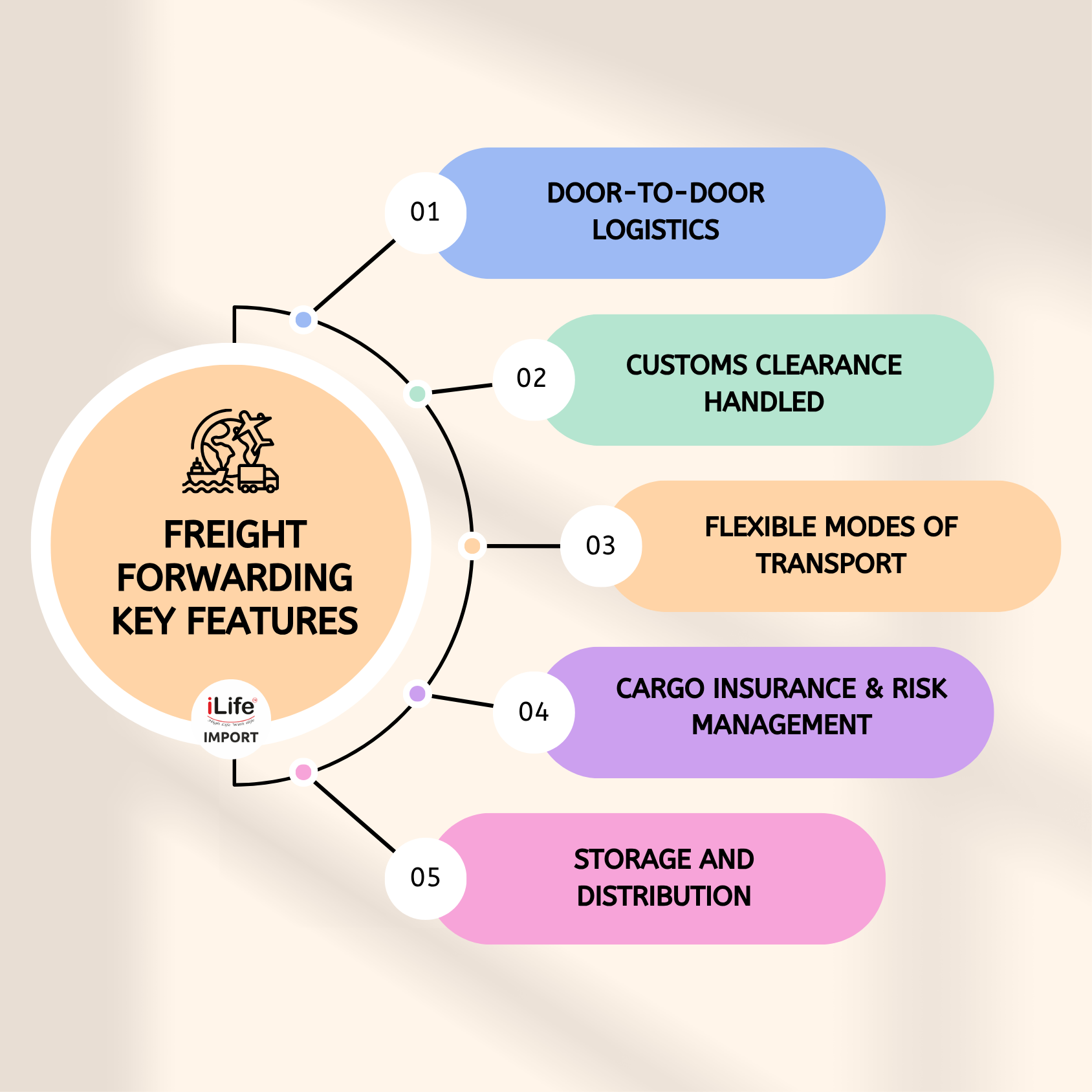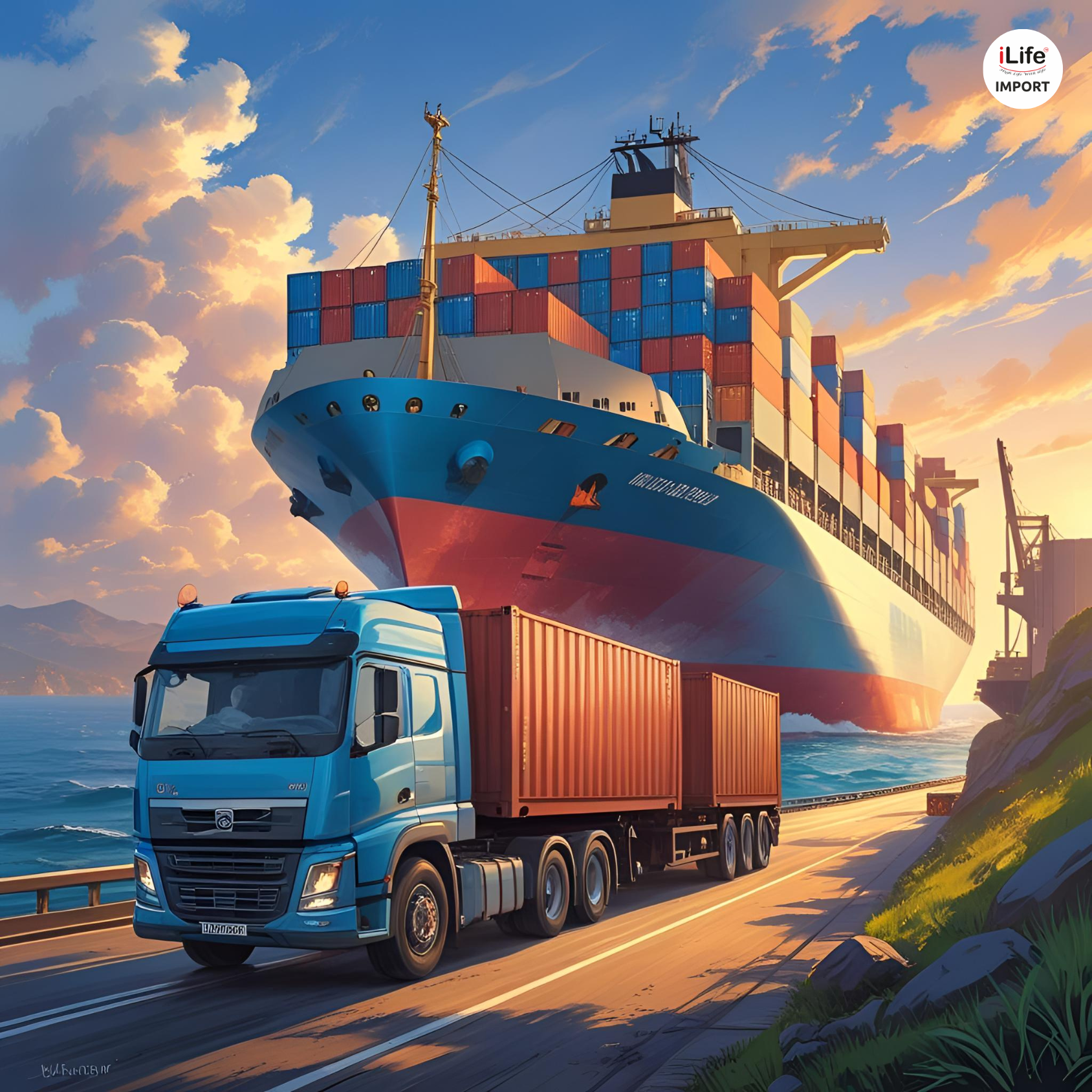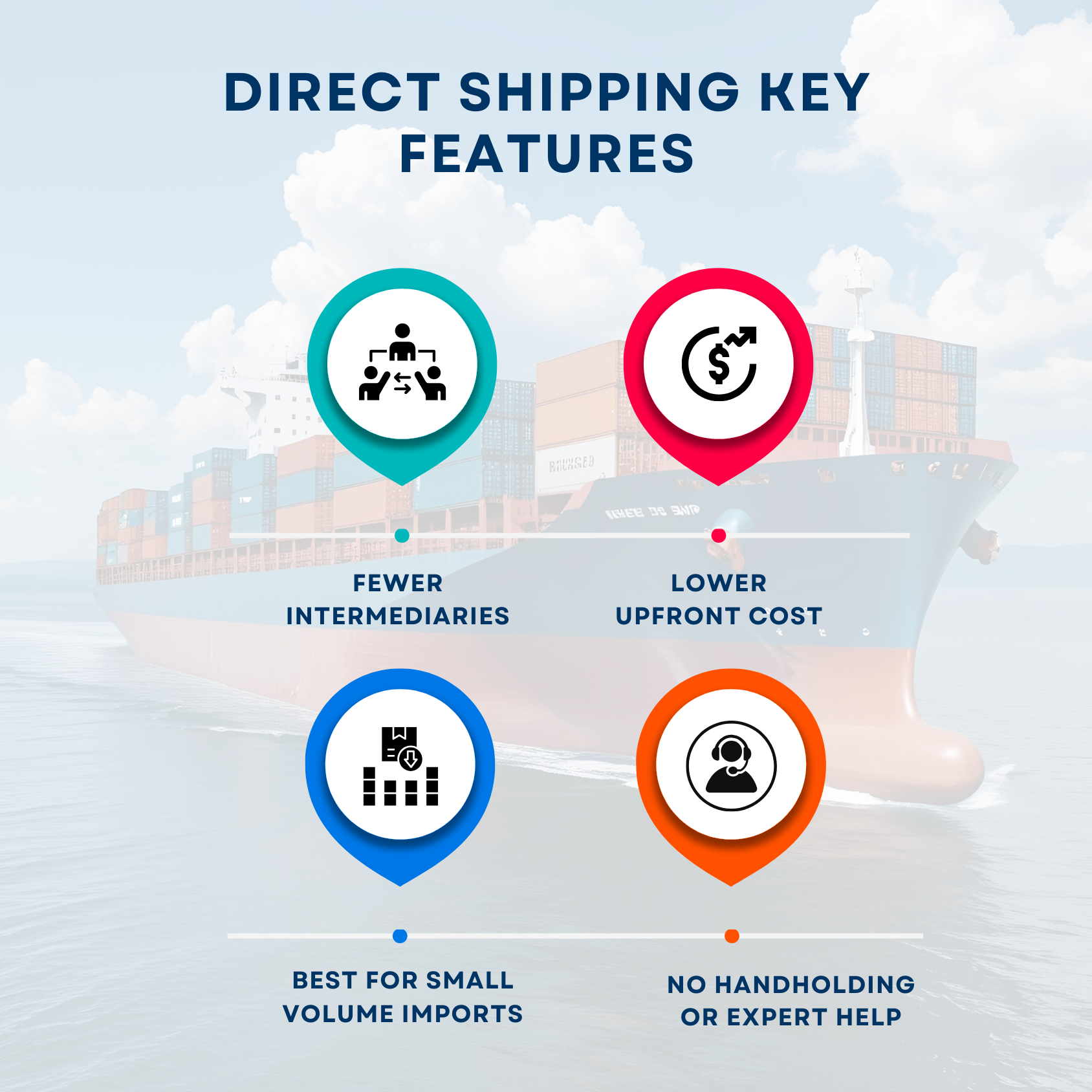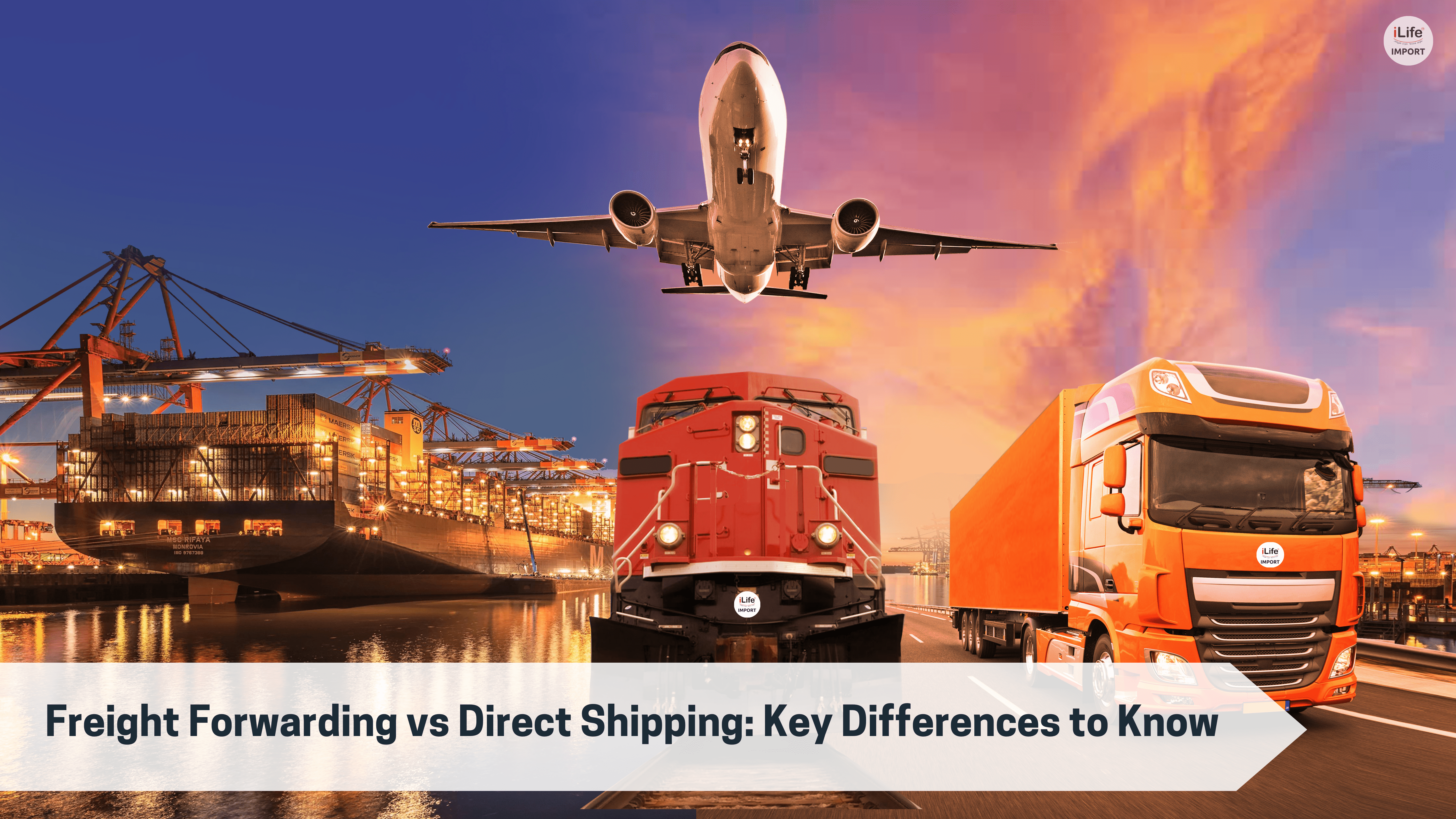In the fast-growing world of global trade, Indian businesses are increasingly looking to import goods from China, Southeast Asia, and beyond. Whether you're sourcing electronics, machinery, garments, or raw materials, one key question always arises:
“Should I choose freight forwarding or go with direct shipping?”
It may sound like a minor logistical detail, but the decision between freight forwarding and direct shipping can significantly impact your business's profit, safety, and success. One wrong choice can lead to shipment delays, customs penalties, or even the complete loss of goods.
In addition, you have to follow the import laws and fulfill the international trade document requirements for safety.
For Indian importers, especially those new to international trade, this guide will help you understand the key differences, pros, cons, and ideal use cases of both freight forwarding and direct shipping. We’ll also walk you through real-life examples and suggest the best shipping method for Indian importers based on your goals and shipment type.
Let’s get started by knowing the basics of freight forwarding and direct shipping.
What is Freight Forwarding?
Freight forwarding is a comprehensive logistics solution where a specialized agent (called a freight forwarder) manages your entire shipment process from the supplier’s door to your warehouse in India.

Think of a freight forwarder in India as a trusted logistics partner who helps with:
- Pick up goods from your overseas supplier
- Arranges international transport (by sea, air, or both)
- Handles customs clearance
- Offers warehousing, cargo insurance, and final delivery
This solution is built for businesses that value peace of mind. It has proven beneficial for business, especially when dealing with bulk cargo, compliance paperwork, and customs clearance in India.
Key Features of Freight Forwarding
Here are the features of freight forwarding to consider:

- Door-to-door logistics: From the supplier’s warehouse in China to your doorstep in India, a freight forwarder organizes the entire journey. There’s no need to use email, contact, or other methods to reach the supplier by yourself.
- Customs clearance handled: All Indian import duties, GST, and clearance documents (Bill of Entry, packing lists, HS codes) are managed professionally. So, the customs clearance in India and China (Export country), and freight forwarders do it.
- Flexible modes of transport: Freight forwarders analyze the best transport modes according to the condition of your goods. They may select sea freight for bulk, air freight for urgency, rail, or trucking for inland delivery.
- Cargo insurance & risk management: Your goods are insured and protected against loss, theft, or damage during transit. So, there’s no worry about how your goods will reach your warehouse from thousands of kilometers away.
- Storage and distribution: If needed, they also arrange warehousing and final-mile delivery within India. Even if you don’t have a space to keep your imported goods in proper and safe condition, in the freight forwarding method, you have the option to place goods in the warehouse of the freight forwarding company. For that, you have to contact the company itself.
Why It Matters?
Many Indian business owners feel overwhelmed by international documentation, customs procedures, and foreign language contracts. Freight forwarding removes that stress and offers you confidence, knowing someone experienced has your back.
Now you understand what freight forwarding is and how it is used in international trading between two parties.
It’s time to know another shipping method used by thousands of importers, especially in India.
What is Direct Shipping?
Direct shipping is when you or your supplier books the transport independently, without a freight forwarder involved. It's used by e-commerce sellers or those shipping samples, small parcels, or low-value goods.

The supplier ships the product straight to your location (or port). For that, you have to take responsibility for the rest, including customs clearance, duties, and delivery within India.
This approach is fast and economical only when everything goes smoothly.
Key Features of Direct Shipping
Here is the list of features you can get if you select direct shipping for goods import:

- Fewer intermediaries: There’s no intermediary involved. You or your supplier handles the entire shipping process directly with the carrier.
- Lower upfront cost: Since you're not paying for full-service freight forwarding, the initial shipping rate may be cheaper.
- Best for small-volume imports: This shipping method for importing goods from another country is ideal for product sampling, dropshipping, or small B2C shipments.
- No handholding or expert help: You’re on your own for customs documents, HS code classification, duties, and compliance with Indian import laws. So, there is less chance of goods mismanagement and other legal consequences resulting in a loss.
Why are Indian startups preferring direct shipping over freight forwarding?
There are three prime reasons why startups in India use this method:
- Less time to reach the warehouse: For direct shipping, there is no wait for weeks and months as with freight forwarding, where big containers take time to reach the port.
- Comparatively affordable: For this shipping method, there is no requirement to hire a specialized person to handle your goods. You and your supplier have to collaborate.
- Full transparency: When a third party is involved in the goods importing procedure, there is a chance of manipulation in legal documents and customs clearance. But in this method, this risk is reduced by 0%.
Note:
If you’re a first-time importer and something goes wrong, like a customs hold or missing documentation, you may end up losing money, time, or even your entire shipment. The anxiety and loss of trust in your supply chain can deeply impact your confidence and business relationships.
There are many kinds of scams involved in importing goods from other countries. So, keep yourself aware of it and follow the trusted and genuine suppliers.
Now you have an understanding of freight forwarding and direct shipping. Let’s explore the differences between these two international shipping methods.
Freight Forwarding vs Direct Shipping: In-Depth Comparison
Here is the difference between freight forwarding and direct shipping across all the key factors Indian importers should consider.
For example, you want to import goods from China. First, you have to find trusted Chinese wholesale suppliers to trade safely and avoid any miscommunication. Once you attend the meetings with them, it helps you to decide a freight forwarding is good or direct shipping is beneficial.
Now you have a question: Which method is perfect for my business? The answer is below.
Which Is Better: Freight Forwarder or Direct Shipping?
There are suitable conditions for deciding the best international shipping to consider, especially when importing goods from another country.
Freight Forwarding is Better If:
- You’re importing in bulk from China to India.
- You want zero paperwork stress and customs handling.
- You value safety, predictability, and insurance.
- Your goods are valuable or time-sensitive.
Direct Shipping is Better If:
- You’re shipping samples or test products.
- You trust your supplier completely.
- You already have experience with Indian customs.
- You want to save money on low-volume orders.
However, in our professional experience at iLife Import, most growing Indian businesses prefer freight forwarding once they cross 2 to 3 shipments.
Why?
Because the cost of making a mistake in direct shipping is often higher than the money saved.
Real-Life Example
Let’s say Rajesh, an importer from Ahmedabad, is sourcing LED lights from Shenzhen, China.
Scenario 1: Direct Shipping
His supplier arranges delivery directly. However, the product description is incomplete, and customs in Mumbai held the shipment for clarification. Rajesh is asked for additional documents and penalized for under-declared value.
Scenario 2: Freight Forwarding with iLife Import
We coordinate with the supplier, verify the HS code, prepare documentation, and pre-clear customs. The goods arrive smoothly, and Rajesh receives his order in 12 days, stress-free.
This story reflects what many Indian importers face in real life. Professional freight forwarding in India is not a luxury; it’s a safeguard.
Now, let’s explore the advantages and disadvantages of each method chosen by importers for shipping.
Freight Forwarding Shipping Method Pros and Cons
Before making any decision on it, take a look at the pros and cons of this method:
Pros
- Full-service logistics support. From loading the goods at the supplier’s port to your warehouse, everything is professionally managed.
- Seamless customs clearance. To clear the goods from the customs department, the freight forwarders are responsible for getting a satisfactory report.
- Lower risk of shipment issues. As professional freight managers are involved in safely managing your goods, the risk of loss, theft, and misplacement chances less.
- Ideal for scaling businesses. Startups in fashion and cosmetic care, and luxury home appliances can choose the freight forwarding method.
Cons
- Slightly higher upfront cost. To take the help of freight forwarders in customs clearance and goods shipping management, the costs will remain higher. Startups with fewer fundraising efforts can’t afford this shipping method.
- Requires coordination with the freight agent. To complete the importing goods procedures, you don’t have to be in contact with the supplier. The freight agent is responsible for it.
If you think direct shipping does not have advantages with disadvantages, then you’re wrong.
Direct Shipping Method Pros and Cons
Refer to the pros and cons of this shipping method:
Pros
- Lower cost for samples or light cargo, like air freight service. If you’re unsure whether to order bulk goods and need a sample to test the quality and check the condition, this method provides a golden chance.
- Good for testing new products. Looking to import furniture from China and want to know the quality, then go with direct shipping.
- Faster for courier-like parcels. By choosing this method, you can receive goods quickly without waiting weeks and months for 3 cartons of plastic products.
Cons
- High risk of delays, penalties, and cargo hold. As you are involved in shipping management, a single false document can put the entire batch of imported goods on hold and require higher authority inspection.
- No expert guidance during customs clearance. If it’s your first time dealing with international suppliers for business goods, customs department clearance is required. Otherwise, it poses a problem for you.
- It may not work well for larger shipments. For example, if you’re importing iron and steel products, then this shipping method may not work, even if you opt for air cargo service.
Now, let’s talk further about the best shipping method for Indian businesses.
What Is the Best Shipping Method for Indian Importers?
The best shipping method for Indian importers depends on:
- Your business size
- Shipment volume
- How familiar are you with import laws
- Your tolerance for risk
For most small to medium enterprises (SMEs), freight forwarding is the more stable and scalable solution. Once your shipment crosses 50–100 kg or involves valuable goods, professional handling becomes essential.
iLife Import: One-Stop Shipping Solution for Indian Importers
At iLife Import, we specialize in offering personalized shipping solutions for Indian importers, tailored to your business needs. Whether you’re importing from China, Vietnam, the UAE, or elsewhere, we offer:
- Full freight forwarding services
- Expert customs clearance support
- Low-cost shipping rates
- Warehousing & last-mile delivery
- Dedicated account managers for every client
We're not just a service provider. We’re your partner in building a smooth, scalable import business.
Need help deciding or ready to simplify your import journey?
Contact iLife Import today for tailored advice, clear pricing, and a smooth shipping experience that grows with your business.
Final Thoughts
Choosing between freight forwarding vs direct shipping isn’t just a technical decision. It’s a reflection of how seriously you take your business’s growth and long-term security.
If you’re new, unsure, or looking to scale up imports, freight forwarding provides peace of mind, reduced risk, and better efficiency.
If you're confident, experienced, and dealing with very low-volume or samples, direct shipping may work but be ready for challenges.
At iLife Import, we’ve helped hundreds of Indian importers move from risky direct shipping to professional freight forwarding, and their businesses are thriving.
Don’t gamble with your cargo. Choose a shipping solution that matches your vision.
FAQs
- Can I start with direct shipping and switch to freight forwarding later?
Absolutely. Many importers begin with direct shipping for small test orders and move to freight forwarding as their business grows.
- Is freight forwarding more expensive?
Not necessarily. When you factor in the risks, penalties, and delays from errors, freight forwarding often saves money long-term.
- How do I find the right freight forwarder in India?
Look for providers like iLife Import who offer full support, transparency, Indian port knowledge, and proven experience with Chinese shipments.
- I want to start an electronics e-commerce business. Which shipping method is good?
As of now, direct shipping will be the right choice if you’re a startup and have a limited budget. Once the business has enough funds, then you can go with the freight forward method to import more goods under the inspection of a freight forwarder agent.
- Can importing goods from China to India be safe or create conflict?
No. You can import goods from China to India safely. The condition is to follow the trade agreement, and government laws, cooperate with the customs department, and pay duties and taxes. There are no additional chances to create a conflict.





